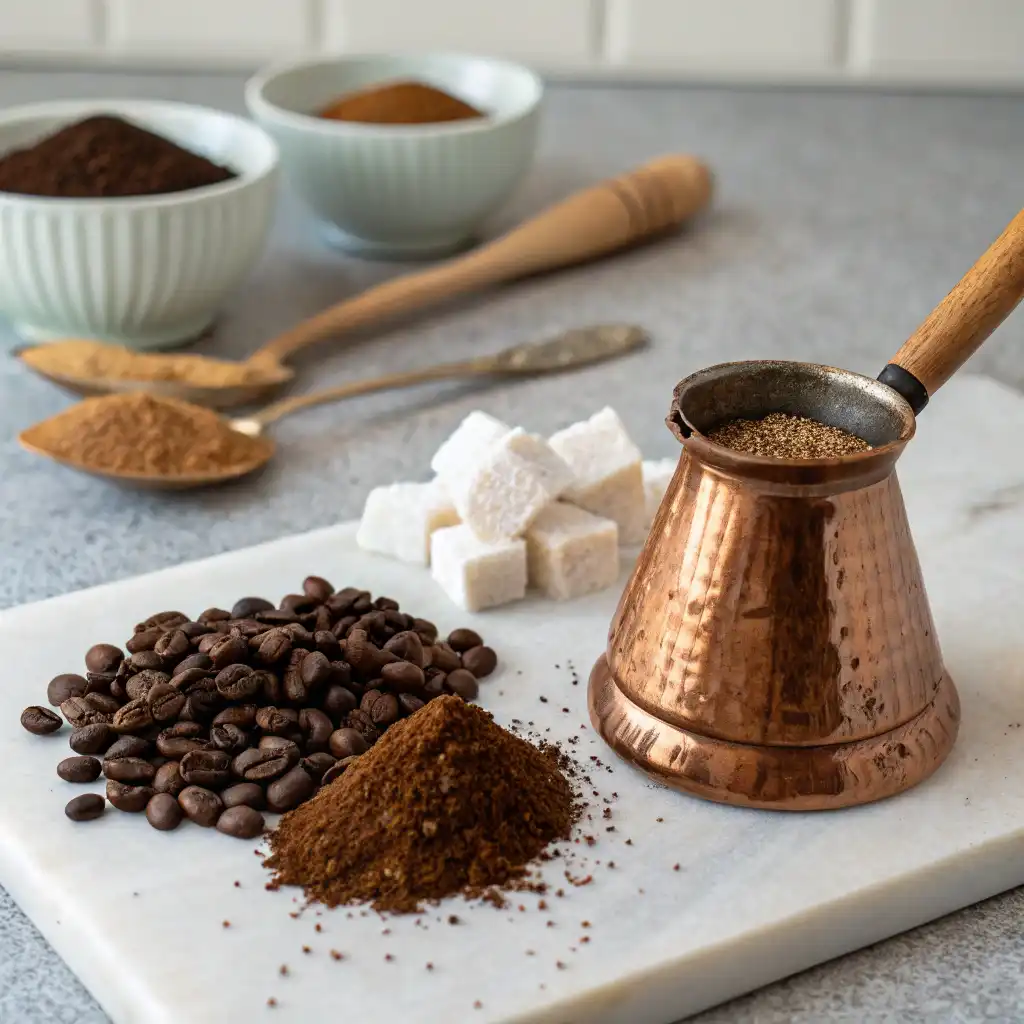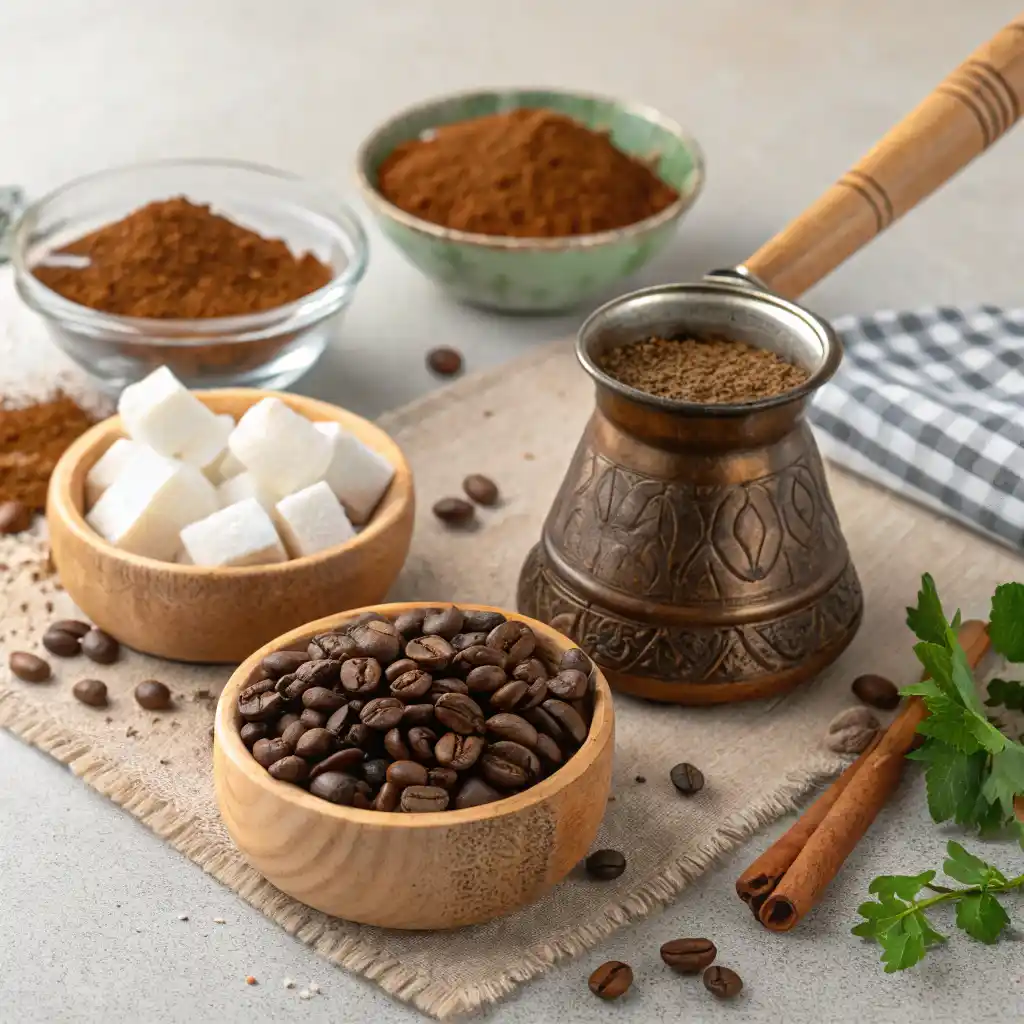Table of Contents
Introduction
Picture this: a steaming cup of rich, aromatic coffee, its velvety texture promising a moment of pure bliss. But something’s off. If your homemade brew doesn’t capture the magic of a cozy Mediterranean café, you’re not alone. This isn’t just a drink—it’s a cultural ritual, a sensory experience rooted in tradition.
During a sun-drenched vacation in Athens, I discovered that making it right is an art form. It’s not just about mixing water with grounds but mastering precision, technique, and the delicate balance of flavors. Unlike standard drip coffee or espresso, this method requires a unique approach—one that’s easy to get wrong if you don’t know the secrets.
What is Greek Coffee?
Ever wondered about the mysterious charm of Greek coffee? It’s not just a beverage – it’s a cultural phenomenon that’s part storytelling, part art, and completely delicious! Why do Greeks call it “Greek coffee” when similar brewing methods exist across the Mediterranean? Well, it’s a tale of cultural pride, historical resilience, and a dash of culinary revolution. Legend has it that the way to truly understand Greek culture is through its coffee – after all, isn’t the way to anyone’s heart through a perfectly brewed cup? So grab your favorite mug, and let’s dive into the world of Greek coffee – where every sip tells a story, and every brewing moment is a celebration of tradition!
Why You’ll Love This Method
Greek coffee isn’t just a drink – it’s an experience that transforms your ordinary morning into something extraordinary! First, let’s talk about cost-effectiveness. Forget expensive coffee shop trips – with just a few simple ingredients and the right technique, you can create café-quality coffee right in your kitchen for a fraction of the price. The magic lies in its unique preparation method using a special small pot called a “briki” and finely ground coffee that creates an incredibly rich, full-bodied flavor.
What makes Greek coffee truly special are its unique characteristics:
- Incredibly rich and intense flavor profile
- Thick, velvety texture unlike any other coffee
- Traditional brewing method that’s both an art and a social ritual
- Minimal ingredients required
- Incredibly affordable to prepare at home
How to Make
Quick Overview
Greek coffee is the ultimate quick-win beverage – ready in just 5 minutes and packed with flavor! This method produces a deeply aromatic, rich coffee that’s both a sensory experience and a cultural journey. Total preparation time is just 10 minutes from start to finish, making it perfect for busy mornings or leisurely weekend gatherings.
Key Ingredients

- Finely ground Greek coffee (or very finely ground dark roast coffee)
- Cold water
- Sugar (optional)
- Small copper or stainless steel briki (traditional Greek coffee pot)
Step-by-Step Instructions
- Measure cold water directly into your briki using the coffee cup you’ll serve in
- Add 1-2 teaspoons of finely ground coffee per cup
- Add sugar to taste (if desired) – traditionally, Greeks prepare coffee in three sweetness levels:
- Sketo: No sugar
- Metrio: Medium sweetness
- Glyko: Very sweet
- Place briki on low heat
- Stir ingredients gently until combined
- Heat slowly without stirring – watch for foam forming
- Just before boiling, remove from heat and pour carefully into cup
- Let sediment settle for a minute before drinking
What to Serve
Perfect pairings for your Greek coffee include:
- Traditional Greek cookies (koulourakia)
- Loukoumi (Greek Turkish delight)
- Fresh fruit
- Baklava
- A glass of cold water (traditional accompaniment)
Top Tips
- Use ultra-fine ground coffee – almost powder-like
- Never stir once the coffee starts heating
- Control your heat – low and slow is the key
- Use cold water for best results
- Let the coffee rest after pouring to allow sediment to settle
Storing and Reheating Tips
Greek coffee is best enjoyed immediately after brewing. Unlike other coffee types, reheating or storing is not recommended as it significantly impacts flavor and texture. If you must store ground coffee, keep it in an airtight container in a cool, dark place and use within 2-3 weeks for optimal freshness.
4 Mistakes You Didn’t Know You Were Making
- Using the Wrong Grind: Regular coffee ground is too coarse. You need an ultra-fine, almost powdery grind.
- Incorrect Water Temperature: Too hot, and you’ll burn the coffee. Too cool, and you won’t extract the rich flavors.
- Stirring at the Wrong Time: Stirring during heating disrupts the crucial foam formation.
- Rushing the Process: Greek coffee is about patience and ritual. Rushing will compromise taste and experience.
For more Greek recipes, visit this link : Ultimate Guide to Greek Breakfast
Can I make Greek coffee without a briki?
A briki is ideal, but if you don’t have one, you can use a small saucepan. However, the foam formation may not be as authentic, and the sediment might not settle as well.
Do I need special Greek coffee beans?
Traditional Greek coffee uses finely ground, medium or dark roast Arabica beans. You can use any dark roast coffee as long as it’s ground to a fine, powder-like consistency.
Why does my Greek coffee taste burnt?
This could be due to using high heat or letting the coffee boil too quickly. Greek coffee should be brewed slowly over low heat to allow flavors to develop without burning.




